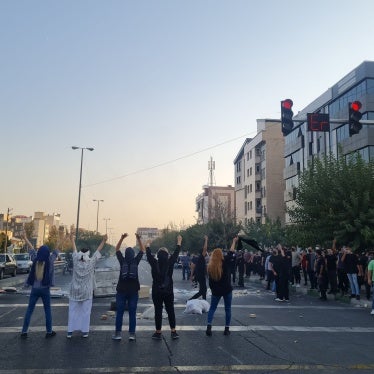(Beirut) – A Saudi court has sentenced three men for peaceful activism to extended prison terms since October 13, 2015, in separate trials. Two of the men, Abd al-Kareem al-Khodr and Dr. Abd al-Rahman al-Hamid, were among the co-founders of the banned Saudi Civil and Political Rights Association (ACPRA).The third, Abd al-Aziz al-Snaidi, is an independent dissident. The sentences range from eight to 10 years.
Like other peaceful activists and dissidents convicted by Saudi courts since 2012, the three faced broad, catch-all charges designed to criminalize peaceful dissent, such as “breaking allegiance with the ruler” and “setting up an unlicensed organization,” as well as vague provisions from the 2007 cybercrime law. All of the charges were tied solely to their peaceful advocacy.
“These outlandish sentences demonstrate Saudi Arabia’s complete intolerance toward citizens who speak out for human rights and reform,” said Sarah Leah Whitson, Middle East director. “King Salman should immediately release all peaceful activists and dissidents from their long prison terms.”
On October 13, the Specialized Criminal Court in Riyadh sentenced al-Snaidi, 41, to eight years in prison, an eight-year ban on travel following his release, and a fine of 50,000 Saudi Riyals (US$9,450), local activists told Human Rights Watch. The activists said that the charges included signing a petition for the Saudi Civil and Political Rights Association, writing tweets that criticized the king, impugning the integrity of the judiciary, and inciting public opinion. Authorities arrested him in February, and he is in Riyadh’s al-Malaz Prison.
The court convicted al-Hamid the same day, sentencing him to nine years in prison, a nine-year travel ban, and a 50,000-Riyal fine. The court convicted al-Khodr on October 19, and sentenced him to 10 years and a 10-year travel ban. Both men are in al-Malaz Prison. Authorities arrested the men in April 2014 and April 2013, respectively, and they have been in jail ever since.
The ACPRA activists faced similar vague charges, which included disparaging and insulting judicial authorities, inciting public opinion, insulting religious leaders, participating in setting up an unlicensed organization, and violating the cybercrime law. Other members of the group have been convicted under similar vague charges and are serving long sentences, including Mohammed al-Bajadi, Abdullah al-Hamid, Mohammed al-Qahtani, Fowzan al-Harbi, Suleiman al-Rashoodi, and Omar al-Saeed. Two other members – Abd al-Aziz al-Shubaili and Issa al-Hamid – are on trial.
Other Saudi activists serving long prison terms include Waleed Abu al-Khair, serving 15 years on charges stemming solely from his peaceful criticism of human rights abuses in media interviews and on social media, and Fadhil al-Manasif, serving 14 years largely for helping foreign media cover popular protests by Saudi Shia in 2011.
Saudi authorities arrested and detained a prominent writer and commentator, Zuhair Kutbi, on July 15 after he discussed peaceful reform proposals in a TV interview. He remains in detention and has not been charged.
Saudi Arabia’s treatment of peaceful activists and dissidents contrasts in some cases with its treatment of defendants accused of committing acts of violence or fighting with extremist groups abroad – some of whom are permitted to enter a “rehabilitation” program in lieu of prosecution. On October 15, for example, the Arab News reported that two Saudi men who fought in conflicts abroad, in violation of Saudi law, were given a royal pardon after completing the rehabilitation program.
Saudi Arabia applies Sharia (Islamic law) as its national law. There is no formal penal code, but the government has passed some laws and regulations that subject certain broadly defined offenses to criminal penalties. In the absence of a written penal code or narrowly worded regulations, however, judges and prosecutors can criminalize a wide range of offenses under broad, catch-all charges such as “breaking allegiance with the ruler” or “trying to distort the reputation of the kingdom.”
Saudi authorities regularly pursue charges against human rights activists based on their peaceful exercise of freedom of expression, in violation of international human rights obligations. The Arab Charter on Human Rights, which Saudi Arabia has ratified, guarantees the right to freedom of opinion and expression under article 32. The United Nations General Assembly’s Declaration on the Rights of Human Rights Defenders states that everyone has the right, individually and in association with others, to “impart or disseminate to others views, information and knowledge on all human rights and fundamental freedoms.”
“It is inconceivable that mere criticism in statements and on social media could land someone in jail for more than a decade, but that’s the sad reality in Saudi Arabia,” Whitson said.








